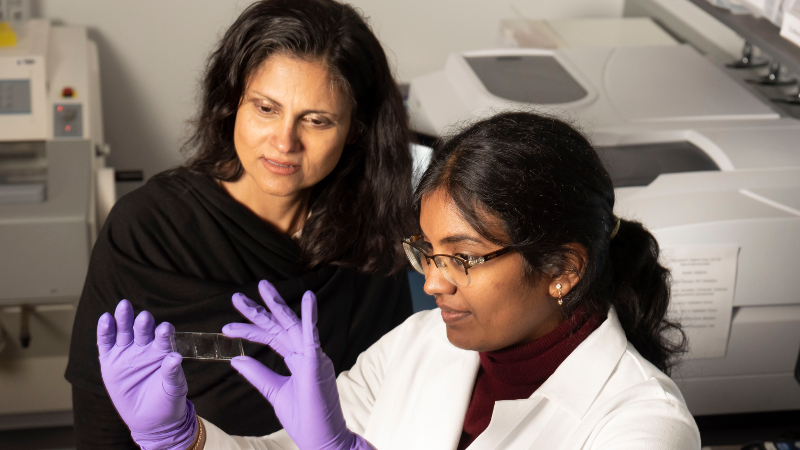
Astronomy Trick Enables Researchers to Capture High-Speed, 4D Videos of Moving Organisms
The imaging technique makes it easier to conduct behavioral studies of freely moving animals
The prestigious honor will fully fund the interdisciplinary cancer research of Enakshi Sunassee, a fifth-year PhD chemical and biomedical engineering student at Duke

The National Cancer Institute has awarded Enakshi Sunassee a prestigious NIH F99/K00 Predoctoral to Postdoctoral Fellow Transition Award for her outstanding interdisciplinary work in cancer research.
Recipients of this award must be nominated, and only one nomination per institution is allowed. Sunassee is currently a fifth-year PhD chemical and biomedical engineering student in the laboratory of Nimmi Ramanujam, the Robert W. Carr, Jr., Distinguished Professor of Biomedical Engineering at Duke University.
“I am very grateful for having received this fellowship and am very excited about the doors it will open for me to keep doing translational cancer research, which will hopefully benefit patients in the long term.”
Enakshi Sunassee
Fifth-year PhD student in the lab of Nimmi Ramanujam
Born and raised in Mauritius, an island nation in the Indian Ocean off the east coast of Africa, Sunassee experienced first-hand the effects of inadequate access to health care. After graduating summa cum laude from the University of South Florida with a BS in chemical engineering, Sunassee came to Duke to fulfill her passion for developing medical technologies that can help people in low-resource areas around the world.
This highly competitive award will fully fund the rest of Sunassee’s PhD work and up to four years of her postdoctoral work. Currently, Sunassee’s PhD work entails identifying changes in metabolism and the vascular system to help distinguish between breast cancer tumors that are resistant and sensitive to chemotherapy. This work could allow clinicians to predict a patient’s response to chemotherapy to better inform their pharmacological treatments to enhance outcomes.
The award will not only help fund this research but will also help Sunassee complete her thesis and identify a lab to transition to for her postdoctoral journey.
“I am very grateful for having received this fellowship and am very excited about the doors it will open for me to keep doing translational cancer research, which will hopefully benefit patients in the long term,” Sunassee said.
Join a thriving, interdisciplinary research community with unique opportunities for translational research.

The imaging technique makes it easier to conduct behavioral studies of freely moving animals

Jessilyn Dunn gathers biometric data from smartwatches to study and predict health changes

When Emma Maddock first started as a biomedical engineering student at Duke, she thought she’d want to explore how to design prosthetic devices. But after taking courses in the BME wet labs, she decided to change course.